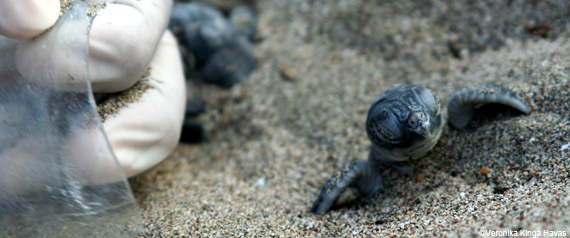On April 22, 1970, the environmental movement was born when as many as 20 million Americans took to the streets to put the health of the planet front and center on the nation's political agenda. Inspired by Rachel Carson's Silent Spring (1962), outraged by the devastation caused by the Santa Barbara oil spill (1969) and modeled on the anti-war movement against U.S. involvement in Vietnam, Senator Gaylord Nelson (D.-Wis.) came up with the idea of Earth Day.
From the beginning, Earth Day was a bi-partisan effort, as Senator Nelson enlisted Rep. Pete McCloskey (R.-CA) as his co-chair. That first Earth Day led to the creation of the Environmental Protection Agency (EPA) and the passage of the Clear Air, Clean Water and Endangered Species Acts. Furthermore, Earth Day served to bring together under one tent the organizations already battling particular concerns -- like industrial pollution, pesticides and toxic dumps, loss of wilderness and extinction of wildlife species -- and led to the creation of many more organizations, including, in 1972, the organization I serve, Ocean Conservancy.
We owe an enormous debt of gratitude to the vision and commitment of Sen. Nelson, Rep. McCloskey and the individuals and organizations that have continued to advance the environmental agenda through 44 years. Not only has Earth Day and what it stands for become mainstream in the United States, but for its twentieth anniversary in 1990, Earth Day celebrations burst forth on the global stage with participation of over 200 million people in 141 countries, leading to the first United Nations Earth Summit in Rio in 1992. It's estimated that 1 billion people around the globe will participate this year.
But even with the great momentum that began with that first Earth Day celebration, one particular concern remains with me. When viewing a photo of Earth from outer space, one is struck by the abundance of waters linking one continent to another. Our ocean covers over 70 percent of the planet's surface, yet mention of the ocean is almost nonexistent in conjunction with Earth Day. If the ocean covers more than two-thirds of the planet, shouldn't it at the very least have "equal billing?"
This year's Earth Day celebration on Washington, D.C.'s National Mall calls for action on the part of governments, individuals and businesses around the world to end extreme poverty and to address climate change. We at Ocean Conservancy applaud this effort. Each of us can -- and should -- take meaningful action to help protect the ocean waters that have been severely degraded by climate change, overfishing and pollution.
A recent article in the journal Science points out that the ocean is being fouled by trash, particularly products and packaging made of plastics, and much of marine life is compromised by the pollution that ensues. Left unchecked, between five to 12 million metric tonnes of plastic will continue to enter the ocean each year, and by 2025, there could be one ton of plastic in the ocean for every three tons of fish.
The situation is dire, but it is not without hope. We can solve this problem. Ocean Conservancy is working with a diverse group of stakeholders, including scientists, individuals, corporations and other NGOs to reverse the tide of dangerous and unnecessary debris entering the ocean. We call on every individual to develop an ethic of responsibility regarding the purchase and use of disposable consumer goods. We call on companies producing goods and materials, especially those that manufacture or produce plastics, to work with us to ensure their products do not end up in the ocean. And we call on governments the world over to establish effective waste collection and management systems that will help not only to stop the flow of plastics and other trash into the ocean but can also reduce flooding and health and sanitation problems associated with unmanaged waste.
With this type of global action from the planet's individual, business and governmental citizenry, the ocean will be healthier and the entire Earth and its inhabitants, humans and wildlife, will benefit. On this Earth Day, let's remember that two-thirds of the planet is ocean, and that we depend on it for our food, livelihoods, recreation, culture and way of life. By doing our part to help the ocean, we help the planet -- and each other.

